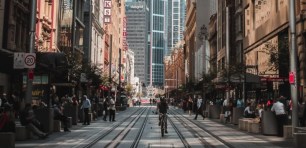
Luxury Escapes co-founder Adam Schwab. Source: supplied.
There was almighty concern last week that NSW Premier Gladys Berejiklian was about to go rogue as the so-called hardliners in the NSW Liberals, led by treasurer Dominic Perronet, were pushing to “live with COVID”.
Berejiklian, however, quickly proved herself to be more Dan Andrews than Margaret Thatcher, and turned very quickly indeed. Within 24 hours, Berejiklian followed the elimination policy, warning that living with COVID would lead to ‘thousands of deaths’. There would be no living with the virus; instead, most of NSW — including regions, most of which hadn’t had a single case of COVID for many months — would be faced with a lengthy, Melbourne-style lockup.
Adopting a policy of virus elimination leads to very different impacts. For the wealthy and those on guaranteed wages (in the public or blue-chip corporate sector), lockdowns are little more than a trifling inconvenience to be dealt with from the Palm Beach weekender. Your writer, who runs a travel business no less, albeit with significant domestic sales, perversely benefits from a harsh COVID elimination policy (which allows interstate borders to re-open far more rapidly). As do politicians, health professionals, lawyers, teachers, retirees and others who comfortably reside in our wealthiest cohorts, whose disposable incomes remain intact or in some cases, enlarged.
The same cannot be said for casual workers, many of whom are young or migrants, and face the very real prospect of not having the means to afford rent. Small business, whose costs remain fixed but whose revenue falls to zero, are also heavily and tragically impacted by elimination policies. School age children (and their parents) are another cohort who bear an unusually high burden (Victorian school children missed upwards of half a year of education in 2020, with underprivileged kids the most affected). The Kids Help Line reported a 184% spike in suicide-related calls in the past year. And while COVID may cause fatigue, Kids Help Line chief executive Tracy Adams warned that actual mental trauma on teens would be long term. Then there’s the horrific increase in domestic violence — in the UK, Office of National Statistics reported a 65% jump in domestic violence reports between April and June 2020.
Comparing the impacts of varying public policy positions is a fundamental tenant of good governance. However, that has rarely occurred since many western governments followed the elimination model adopted by China’s, Xi Jinping in Wuhan province.
To sell a strict elimination policy — as Berejiklian is now doing — requires two distinct aspects.
First, proponents need to ignore the harm caused by forced lockdowns. Youth suicide and domestic violence are almost never mentioned by politicians when announcing a lockdown. But while the impacts are real, reporting is delayed often by months or years, as opposed to COVID cases, which are breathlessly reported daily like football scores.
Second, one needs to overstate the risks of the virus. While COVID-19 is not a hoax and in fact, can be a very capable killer (in the right circumstances with the right victim), the Australian public has been manifestly misled in terms of the actual risks of the virus. An ABC survey in May 2020 indicated that 16% of Australians were “extremely concerned about a family member getting COVID.”
In reality, globally, 99.96% of people have not succumbed to COVID, and even in the world’s very worst hit regions like Italy or Brazil, with health systems far inferior to ours, the highest death rates globally have been 0.20% of the population.
That’s why Berejiklian’s claim that “thousands of people” would die if the virus roamed free doesn’t quite add up.
In Sweden, which long adopted a policy of living with COVID, there have been around 1,437 deaths per million people, with many coming in the early days of pandemic due to a failure to protect the vulnerable in aged care homes. Based on Sweden’s fatality rate, if NSW were to live with the virus, there could be around 600 deaths per month.
But that potential death toll exists in a world with no vaccine (Sweden’s death rate has fallen to almost zero now, with 55% of the population received their first vaccine dose), as well as significant improvements made in treatment of COVID-19.
While Australia’s vaccine rollout has been painfully slow, there has been reasonable progress vaccinating the genuinely at-risk segments of the community. Virtually all aged care residents have been offered the vaccine, while 67% percent of Australians aged over 70 have had at least one dose.
In Victoria’s deadly second wave last year, 82% of deaths occurred in private aged care homes. In the last six weeks, three vaccinated aged-care residents in Victoria and NSW, all aged above 90, contracted COVID-19. None were symptomatic. Currently, not a single person in hospital in NSW has been fully vaccinated.
Based on current levels of vaccination and improving vaccination rates, living with COVID would likely cause closer to 500 deaths in NSW, with the vast majority of fatalities occurring in elderly people who have been offered a vaccine, but chose not to accept it.
It should be said, the decision to live with COVID, especially in a population that is still several months from full vaccination is an incredibly difficult one. The government needs to weigh the likelihood of COVID fatalities with increased domestic violence, an explosion in youth suicide and depression and significant educational impacts, especially for underprivileged children.
But all significant policy decisions involve weighing up relative costs. We allow people to drive motor vehicles knowing that thousands of deaths and injuries will certainly result, many of whom will be innocent pedestrians or passengers. We continued to allow cigarettes to be sold, knowing that tobacco leads to upwards of 20,000 deaths every year. Governments fund large construction projects, which actuaries determine will lead to an easily calculable number of workplace deaths.
Zero-COVID advocates are far too quick to look only at one side of the equation, being the health impacts on the at-risk elderly (who have chosen not to be vaccinated) while completely ignoring the health impacts on the young. And it is likely in a decade when we reflect on this decision, our slavish adherence to only half the argument will possibly be viewed as the greatest public policy errors Australia has ever made.
If you or someone you know is affected by sexual assault or violence, call 1800RESPECT on 1800 737 732 or visit 1800RESPECT.org.au.
For anyone seeking help, Lifeline is on 13 11 14 and Beyond Blue is 1300 22 4636.
Adam Schwab is a company founder, angel investor and author. He has been a Private Media board member since 2019.
Handpicked for you

Should we let COVID-19 rip through communities? Most economists say no



COMMENTS
SmartCompany is committed to hosting lively discussions. Help us keep the conversation useful, interesting and welcoming. We aim to publish comments quickly in the interest of promoting robust conversation, but we’re a small team and we deploy filters to protect against legal risk. Occasionally your comment may be held up while it is being reviewed, but we’re working as fast as we can to keep the conversation rolling.
The SmartCompany comment section is members-only content. Please subscribe to leave a comment.
The SmartCompany comment section is members-only content. Please login to leave a comment.